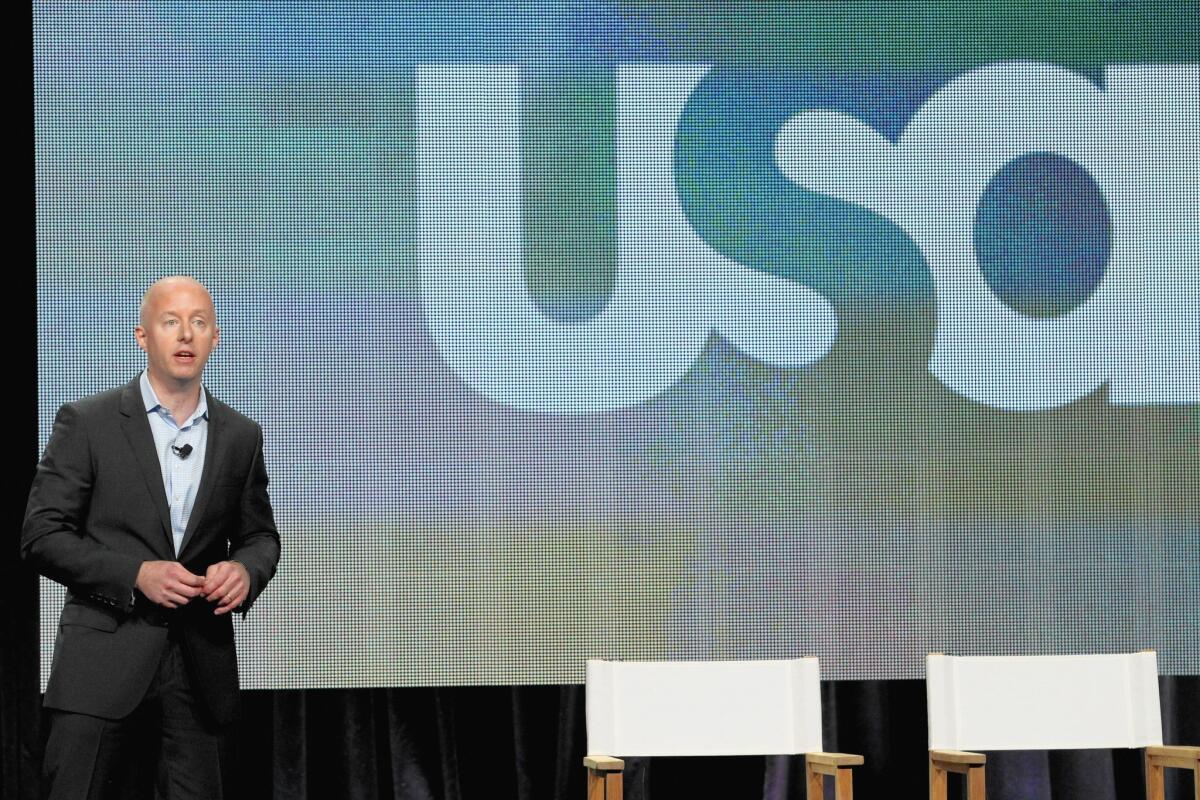USA Networkâs âblue skiesâ programming takes an edgy, serialized turn

USA Network, known for TV dramas of the laid-back variety, is adding more tension to its lineup.
For years the cable channel has applied a lighthearted filter â dubbed within the industry as a âblue skiesâ approach â to its roster of original programming. Optimism and humor have served as alternatives to some of the more brutal and darker shows on competing networks.
------------
FOR THE RECORD
Nov. 11, 10:45 a.m.: This article previously listed âThe Brandâ and âThe Farmâ as pilots for the network. âThe Brandâ is not one of its pilots, and âThe Farmâ remains a script the network has in development. A previous caption on this article misstated USA Network President Chris McCumberâs first name as Scott.
------------
Think crime dramas with some quirk, not bloody shootouts.
Now the NBCUniversal-owned channel that once introduced viewers to an obsessive-compulsive police consultant named Adrian Monk is moving toward edgier characters and more serialized storytelling. It is an attempt to remain relevant as audience tastes shift and consumption patterns change.
The rise of streaming services has shown that there is a market for darker shows that hook viewers with stories that unfold over multiple episodes or an entire season. These types of shows often translate into lucrative syndication deals.
And at a time when the TV space is overrun with original programming, maintaining even a semblance of a grip on an audience is more crucial than ever. Thereâs even been a big boost in scripted and unscripted shows during the traditionally quieter summer months.
The heightened battle for eyeballs is reflected in the ratings drops across the cable industry.
Nearly all of cableâs top networks have suffered double-digit declines so far this year in the advertiser-coveted 18-to-49 age demographic. The drops are especially staggering in commercial ratings that include three days of recorded playback.
Although USA Network was cableâs top-rated network, it was down nearly 18% in that demographic in the third quarter. Also experiencing audience drops are TBS, which was down 16%; as well as Nickelodeon, MTV and TNT, which were down about 12% from a year earlier, according to research firm MoffettNathansonâs analysis of Nielsen data.
This is something television executives are concerned about, given how the numbers serve as the tender for advertising dollars.
âI think everybody being down at the same time is a little surprising,â Chris McCumber, president of USA Network, said in an interview at Comcastâs NBCUniversal offices in Universal City. âWhen you look at a list where nearly all the [cable] networks have a negative next to it, I mean, I havenât seen that yet. But this is a cyclical business. Next year, we might see everybody have a positive next to it.â
The glut of shows is growing at breakneck speeds, probably leaving the cable space with a tough road ahead.
Steve Burke, chief executive of NBCUniversal, offered some blunt soothsaying when he spoke to analysts last month during an earnings conference call.
âThe fact of the matter is, the next five or 10 years in basic-entertainment cable, as it relates to ratings, are going to be much more difficult than the last five to 10 years,â Burke said. âOur big cable channels, particularly when sold as a portfolio, are very attractive and very powerful. I just think itâs unreasonable to assume that the ratings for those businesses are going to grow if you look over a five- or 10-year period.â
Burke also suggested that the company might bolster USA by moving sports programming from other NBCUniversal channels to its lineup.
TNT and TBS, which are USAâs biggest competitors, offer college and professional sports that have helped drive viewership. And, more importantly, sports help boost affiliate fees charged to cable companies. McCumber did not elaborate on its sports plans.
USA Network has a lot riding on maintaining its standing.
The network has been one of the pioneers in the cable sector in venturing into original programming, and it has long been the golden asset in NBCUniversalâs portfolio. USA has been generating earnings of more than $1 billion annually in recent years, and it produces one-third of advertising revenue for the companyâs cable channels, according to estimates from consulting firm SNL Kagan.
Stacey Lynn Schulman, executive vice president of strategy and analytics at Katz Media Group, said that USA and some of its cable competitors are run like broadcast networks by offering more broad-based programming.
And thatâs not good enough anymore in a cable landscape in which meth dealers and motorcycle outlaws drive ratings and woo critics.
âThey are not in the worst position to experiment,â Schulman said. âBut they do need to experiment if they want to compete with what audiences are interested in. And they are not only competing with the best of television today, but also yesterday and last year and so on because the library of content is now at everyoneâs fingertips.â
McCumber said three unavoidable factors called for a greater pivot in USAâs evolution: advancing technology, a new generation of viewers, and the countryâs mood.
âThe thing we hear over and over again is the word âstruggle,ââ McCumber said. âThis idea of âthe 1% is doing fine, the 99% is still hurting.â And I think thatâs reflected in the darker mood of the country.â
He said that USA Network also must contend with the fact the key 18-to-49 audience is being driven by millennials, not baby boomers. âWhen we think about programming, we have to keep that in mind â not that weâre going to become the CW tomorrow,â he said.
Meanwhile, he said viewers shouldnât expect the network to try to emulate âThe Walking Deadâ or âAmerican Horror Storyâ in its lineup.
âI think it would be a mistake for us to move down that road of super-dark and gritty,â McCumber said. âIf youâre last to the party, youâre going to be the last in the trend. We think thereâs an opportunity to catch an audience that is maybe oversaturated with that darkness, and looking for that glimmer of hope.â
Bill Daddi, founder of Daddi Brand Communications, says the key is to not totally alienate viewers.
âItâs always a challenge for any brand not to deviate too far from what its brand equity has been as it seeks staying relevant,â he said. âMany networks have been able to make the transition from what had been their core programming without totally alienating viewers. Look at MTV, itâs the same demo, but they changed their content approach.â
Jeff Wachtel, president and chief content officer at NBCUniversal Cable Entertainment, said itâs been an interesting evolution to observe.
âIt used to be that cable networks were the streaming service, they were the place you caught up on your favorite shows in reruns,â said Wachtel, who previously served as co-president of USA Network with McCumber and helped it adopt its blue-skies programming. âThen advertisers wanted cablers to differentiate themselves from the reruns. Now itâs all about finding ways to zig while everyone else is zagging. And thatâs not easy.â
The network will scale back its development in the comedy and reality arena to give its full attention to developing scripted dramas with darker undertones.
The shift started with legal drama âSuitsâ in 2011 and crime drama âGracelandâ in 2012 â both playing on themes of moral ambiguity and corruption.
But the networkâs move away from its tried-and-true blue skies programming will be more substantial in the coming year.
Among the shows the network has in its pipeline include âMASHâ-esque dramedy âStanistan,â starring âDexterâsâ Jennifer Carpenter; alien-themed âColonyâ from âLostâ alum Carlton Cuse; and tech-themed âMr. Robot.â
And coming in March is the delayed premiere of âDig,â a murder-mystery drama set against the backdrop of modern Jerusalem from Tim Kring (âHeroesâ) and Gideon Raff (âHomelandâ).
âThe goal is to create urgency,â McCumber said. âIt will take time but, like the theme of our next phase, weâre hopeful.â
More to Read
From the Oscars to the Emmys.
Get the Envelope newsletter for exclusive awards season coverage, behind-the-scenes stories from the Envelope podcast and columnist Glenn Whippâs must-read analysis.
You may occasionally receive promotional content from the Los Angeles Times.











